The Health Benefits of volunteering have always been a subject of discussion for many folks. Several studies have been conducted on the issue, and the findings are interesting.
People have always offered their time and energy towards good causes. There is never a shortage of activities that could use an extra pair of hands. People get actively encouraged to spare some of their time for volunteering.
While there are many opportunities, how do they impact the participant’s health? We look at how these activities impact the workers’ lives and health.
Here’s how volunteering affects the participant’s health:
1. Lessens The Risk Of Depression
We tend to get into depressive tendencies when we settle into unfulfilling patterns. Volunteering helps manage such tendencies.
It helps us deal with our feelings and puts things into perspective. Volunteering helps us see the world through a different lens. We get to interact with people from different backgrounds and walks of life.
Graphical data depicting the relationship between volunteering and depression tendencies across different age groups.
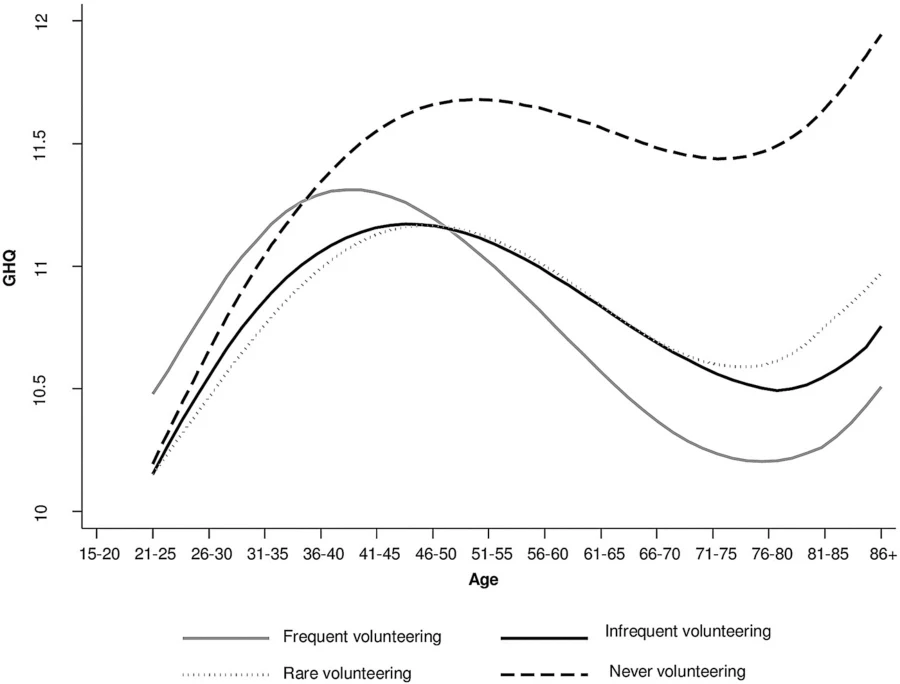
Through volunteering, we share stories and intimate feelings. It fosters a sense of togetherness. Depressive feelings tend to occur whenever we feel that no one else is in tune with us.
Volunteering enables us to meet people with similar experiences and helps form great bonds and lifelong friendships.
The National Institute of Health and Research care finds a strong link between depression and loneliness.
Volunteering could be the start you need to get out, meet new people, and share new experiences. Volunteering is especially helpful for adults aged 50 and over.
The statistics make it clear that people who don’t volunteer are more likely to get depressed. It is even worse as the individual gets older.
Volunteering is good for your mental wellbeing.
2. Increases Self Confidence
Volunteering helps with self-confidence and self-esteem. Many cases of low self-worth are attributed to having feelings of non-accomplishment. It tends to breed an inferiority complex among many, especially males in their mid to late 20s.
It doesn’t have to be the case. Volunteering is a credible way to get out of your slump and feel accomplished. Many volunteers feel gratification in participating in causes that benefit others.
Relationship between self-confidence and the impact of volunteering.
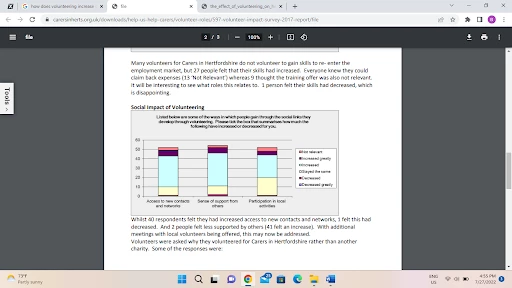
It helps you get a greater feeling of self-worth whenever you participate in an activity then benefits the society around you.
Volunteering helps you identify as an integral member of your society. It gets you out of your comfort zone and enables you to contribute to positive change.
The best part is that anyone can volunteer. Many programs and causes could always use a pair of hands. Get into a program today and be part of your community.
3. Helps You Get In Better Physical Shape
Most voluntary work tends to be physically intensive. Some causes aren’t physically demanding, but most help you get into better physical shape.
Most positions require you to move within a certain community and actively interact with people. Volunteering is especially helpful for people who live a sedentary lifestyle.
Most people have set routines that barely require any physical application. Our society around us is built to make most tasks convenient.
Relationship between physical fitness and exercise
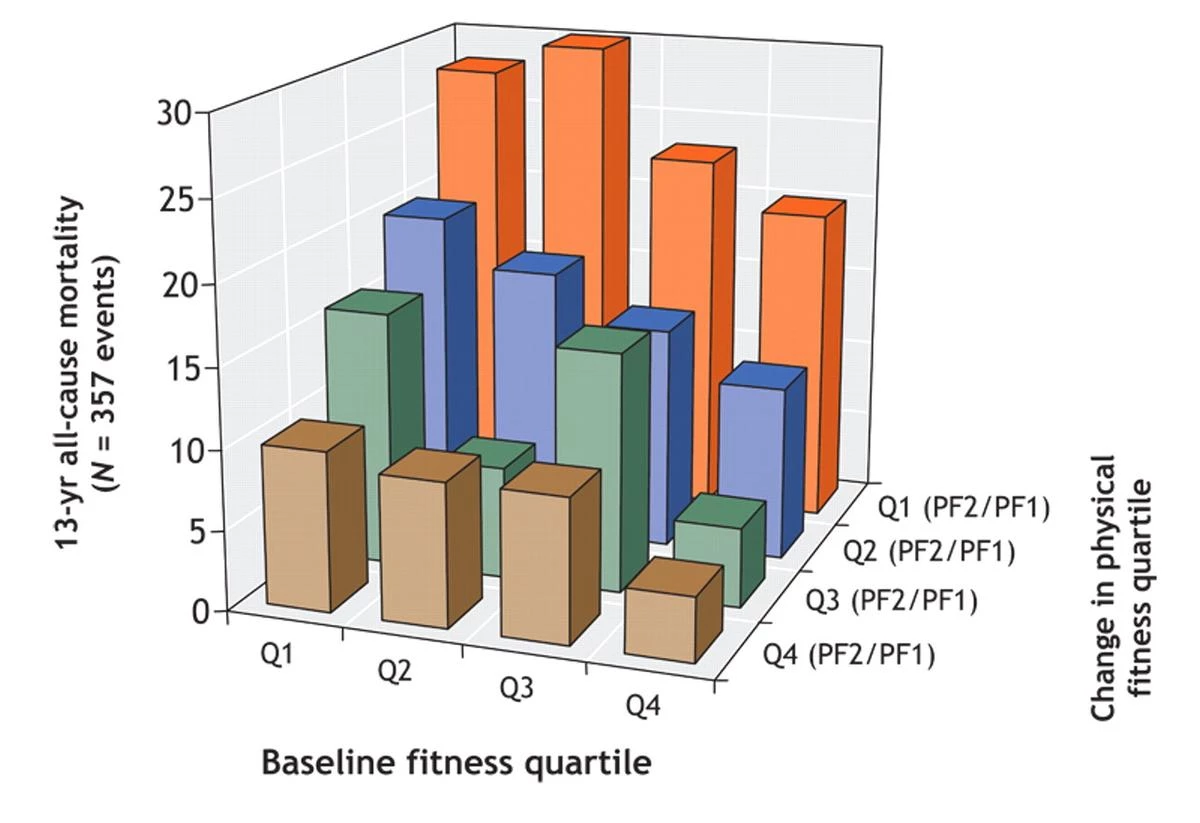
Volunteering gets us out of our sedentary lifestyles and fixed routines. It helps us get into better physical shape, especially if we do it regularly.
Volunteering helps many people discover how unfit they are. It helps them realize that they need to get into better physical shape.
If you want motivation to get healthier, try some volunteering jobs like Habitat for Humanity. Not only do you get a decent workout, but you also contribute positively to society.
4. Reduces Stress
People who volunteer their services and labor tend to have less stressful lives. Volunteering is a great way to release and relieve stress.
People who take on these jobs find satisfaction in serving their communities. The satisfaction alone is enough to overcome feelings of stress and mental suffocation.
Relationship between stress and physical activities in volunteering
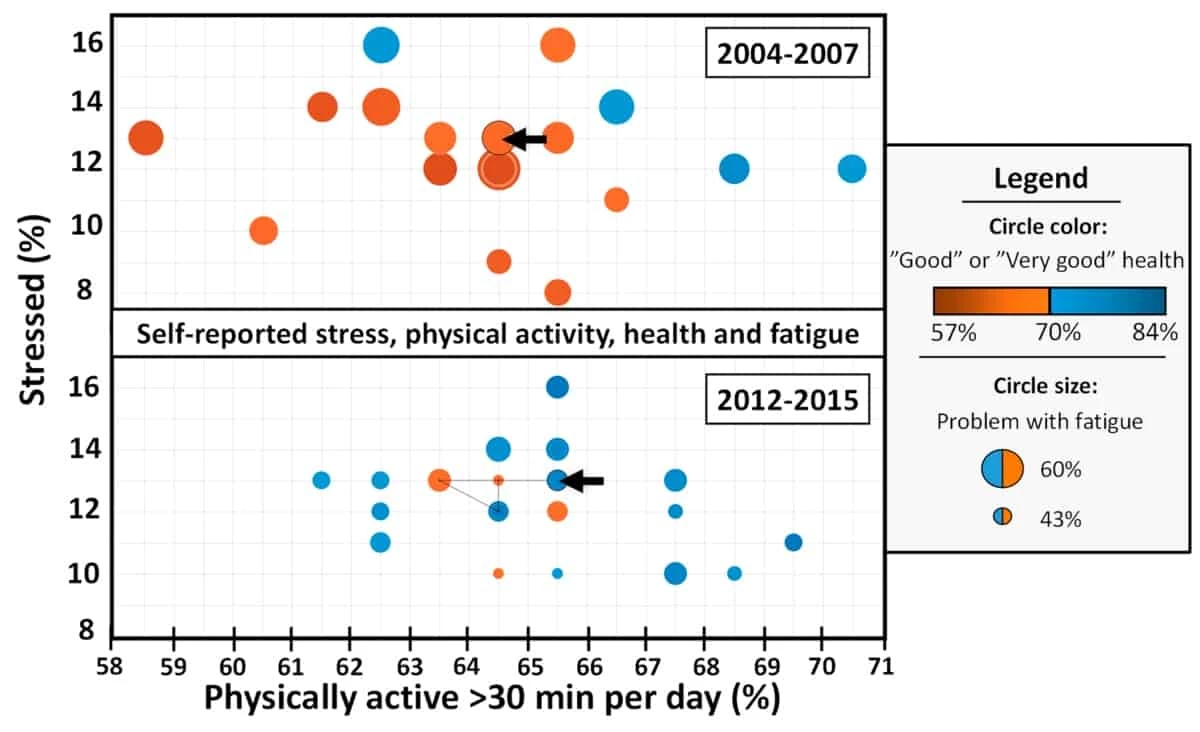
Volunteering breaks people away from their usual routines. It allows them to experience new things, interact with different people, and learn and grow. A break in routine is almost as good as a vacation, especially if you have a demanding job.
Taking a break is healthy, and there are fewer better ways to do it than becoming a volunteer. Volunteering releases dopamine into your body, and you feel better about yourself.
It gives you a different outlook on life. It helps you become part of something bigger than yourself and helps you become better.
Get rid of your anxiety and stress by becoming a volunteer.
5. Reduced Risk of Blood Pressure
Did you know that volunteering could potentially help reduce chronic illnesses? Many volunteer positions require some level of physical input.
Volunteering helps with your overall body fitness and, consequently, helps reduce your risk of getting hypertension.
Relationship between blood pressure and physical exertion.
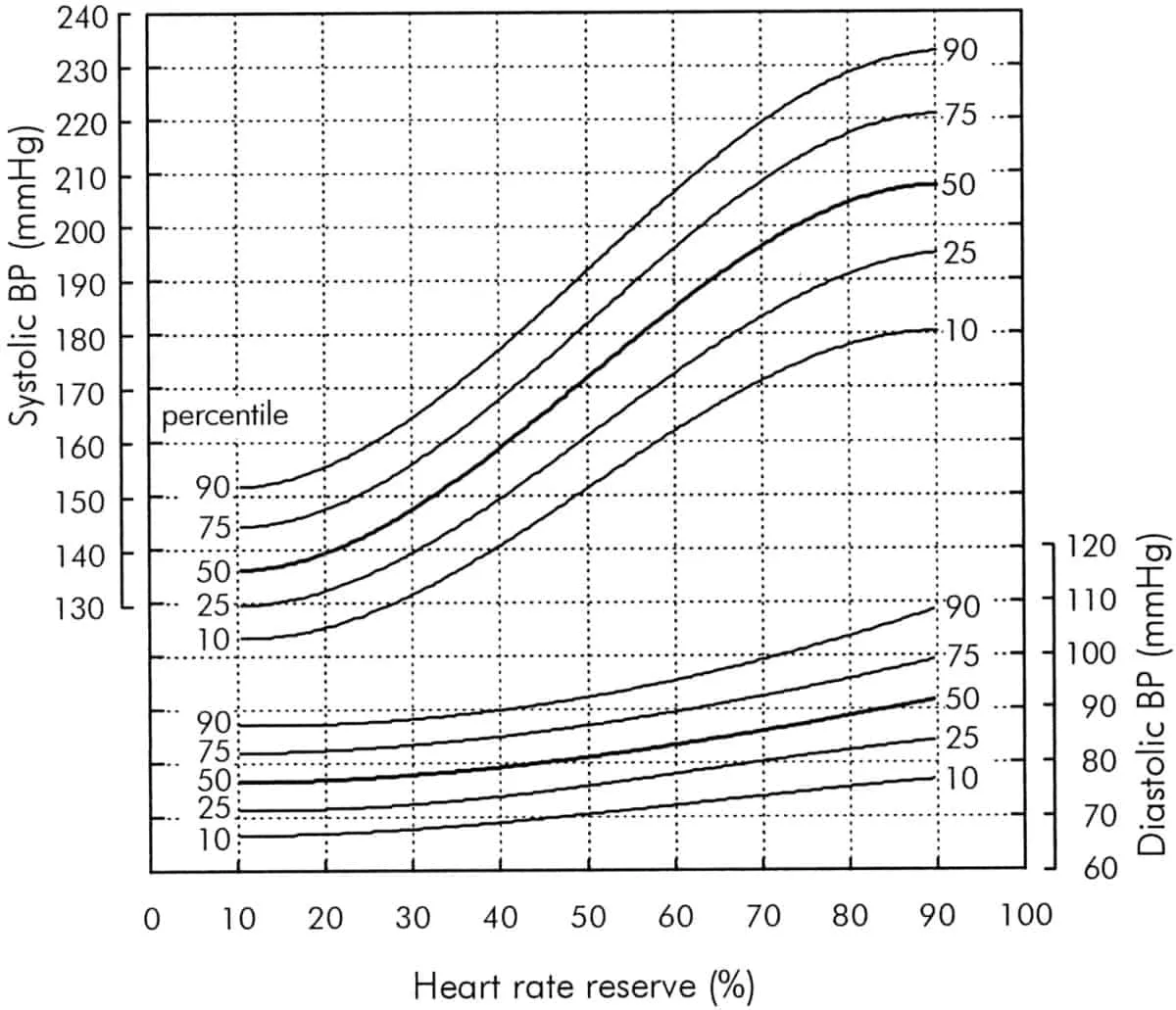
Getting in a decent workout through a volunteer program is, therefore, good for your health. It all depends on how physically demanding these volunteer tasks are.
Tasks that require walking, climbing stairs, running, and even gardening are great. When you do these activities, you exercise your heart. You have better health as a result.
These exercises don’t have to be intense to improve your blood pressure. It is certainly better than doing nothing.
Try to get tasks that give you a good workout whenever you volunteer. Volunteering helps lower other risk factors for blood pressure, such as stress and depressive tendencies.
Note that you don’t have to overexert yourself while volunteering.
6. Better Cardiovascular Health
Volunteering is not only good for regulating hypertension; it helps with your overall cardiovascular health. There are so many other illnesses that you can avoid through physical volunteering tasks.
Volunteering could help prevent conditions such as arteriosclerosis. It gets caused by an accumulation of fatty deposits on the artery walls.
Relationship between cardiovascular ailments and physical exertion.
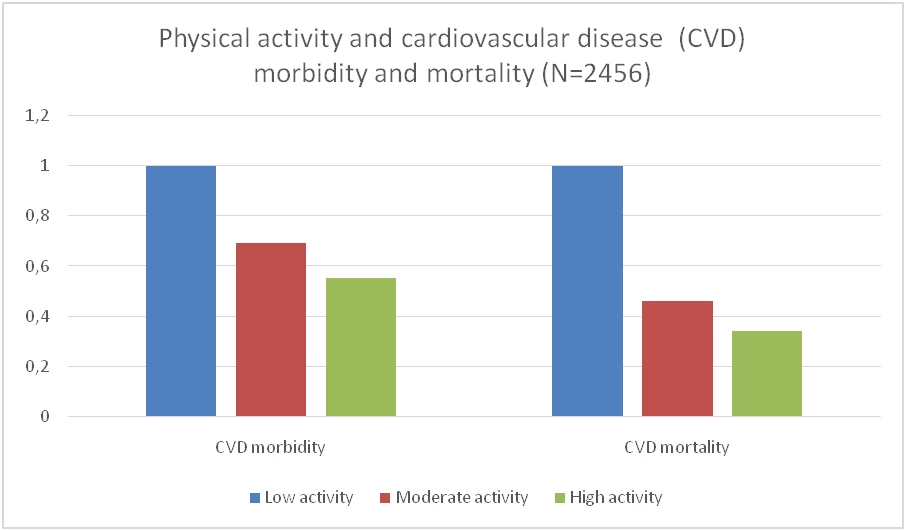
Simple exercise and physical activities in volunteering reduce risk factors. Volunteers for physically intense tasks are less likely to contract the disease.
Volunteering for physically intense activities also prevents other diseases such as coronary heart disease.
The disease results from fatty deposits in the arteries around the heart. People who volunteer often get exposed to fewer risk factors for search diseases.
Simple activities like packing boxes for foodbanks or cleaning garbage off a beach could help you get a good workout.
You could volunteer as a means of passive exercise or as a way to complement your workout routine.
7. Reduces Loneliness and Lonesome Tendencies
Life can often get lonely, especially if you aren’t in an environment surrounded by your loved ones. It doesn’t have to be the case.
Volunteering is great and can help you get out of your shell. Through volunteer programs, people meet friends and develop strong and meaningful interactions.
How volunteering assists patients overcome loneliness and improving self-care.
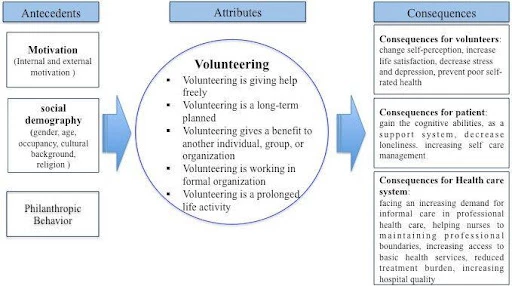
Volunteers normally start as strangers to each other but eventually develop great friendships.
You meet so many people with interesting stories and origins. You get to know people with different and similar interests. It is a great and natural way to make friends and meet partners.
English Longitudinal Study of Ageing (ELSA) shows that 66% of retired adults tend to experience loneliness. It also associates depressive tendencies with loneliness.
Volunteering presents people with opportunities to socialize and make friends. It also allows people to come together for a good cause and a sense of community.
8. A Happiness Effect
Volunteering allows us to connect with others who have had similar experiences, fostering strong relationships and enduring friendships. The National Institute of Health and Research has shown a significant connection between loneliness and depression.
A good way to pursue happiness and feel accomplished is to volunteer. Many volunteers have intense sentiments of satisfaction when they contribute to worthwhile organizations.

When you engage in an activity that benefits your community, you gain a greater sense of self-worth.
Serving their communities brings happiness to those who embark on these responsibilities. Stress and mental suffocation can be overcome simply by satisfaction.
People who volunteer depart from their daily routines. It allows them to try new things, socialize with new people, learn, and develop.
Volunteering gives people intrinsic happiness and satisfaction in making other people’s lives better. It also teaches empathy and other credible life skills.
9. Reduces the Risk of High Blood Sugar
High blood sugar is a common dietary and lifestyle disease. It is prevalent in cities and areas where people live sedentary lifestyles.
Dieting aside, people who don’t often engage in physically stimulating activities are likely to get the disease. Some people are genetically predisposed to have a higher risk of developing the illness later in their lives.
Relationship between blood sugar levels and exercise intensity.
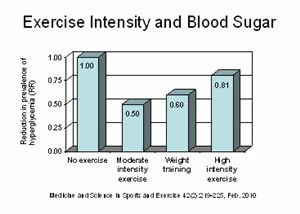
So, how can volunteering reduce your risk of developing high blood sugar? Volunteering engages the body in physically stimulating activities. It helps you get a good workout and reduces the risk factors for getting the illness.
You are less likely to develop diabetes if you eat well and volunteer for physically demanding jobs. It helps your body regulate sugar better.
People suffering from diabetes mellitus exhibit fewer server symptoms whenever they engage in physically stimulating activities.
Most sports and environmental projects are always looking for volunteers. These tasks could help you keep fit and avoid many lifestyle diseases.
10. Social Well Being
There are so many facets to healthcare. Many folks tend to focus on their physical and mental health. Social wellbeing often gets neglected.
There are many ways of establishing meaningful social connections, and you can do it through volunteering. How does it work? People volunteering for a cause are often bought together for a particular cause.
In the cause of their interactions, different group dynamics emerge. People create working relationships, which often evolve to close and personal bonds.
Stages of volunteering and fostering strong social relationships.
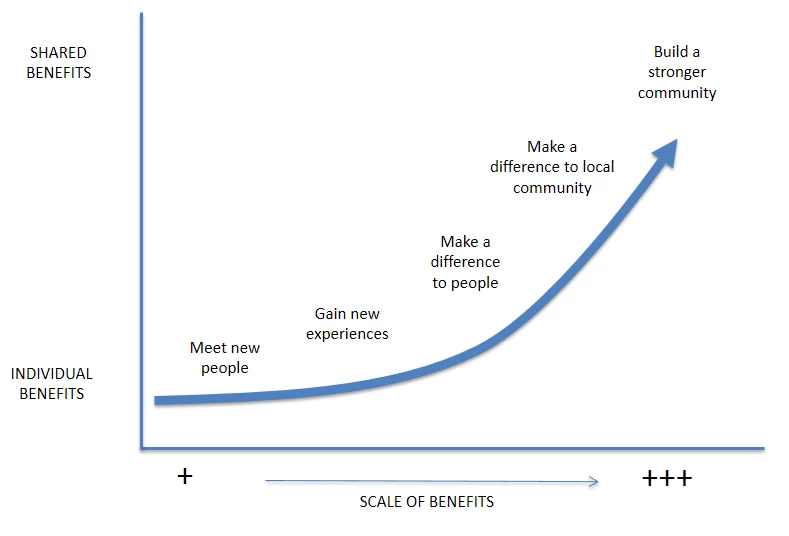
In the process of working together, you develop a social network. Social networks are important as they form the fabric of our society.
You develop a sense of belonging to a particular group. Healthy social interactions help us deal with our problems.
It is satisfying to have a community that supports you whenever you are going through a tough time. Volunteers get to experience healthy group dynamics and forge good relationships.
11. Healthy Work-Life Balance
The demands of society today often place a lot of emphasis on work. People spend most of their time working or doing work-related activities.
It leaves very little time for other activities that matter. Working is important, as people have to provide for themselves and their loved ones. It is important to balance your work and other activities. Volunteering helps you get a great work-life balance.
Most people who volunteer do not consider the activities work. These folks take time out of their day to serve others.
Relationship between work-life balance and the proportion of mental wellness among workers.
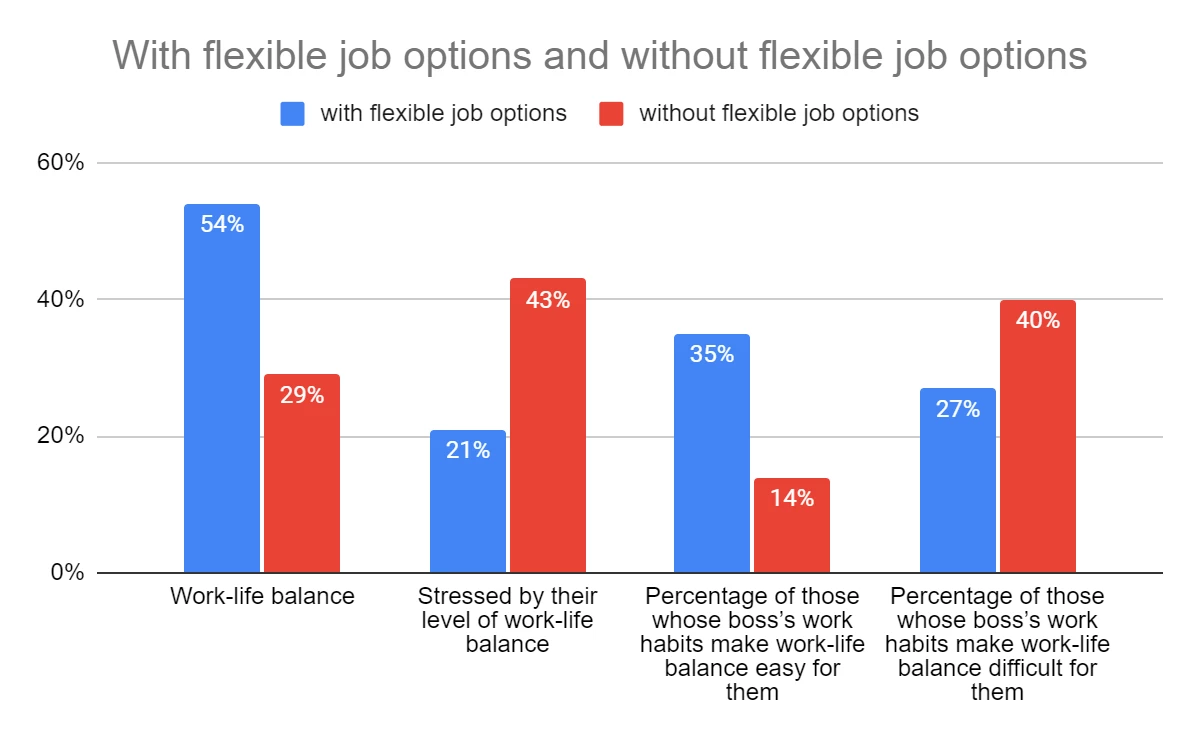
Volunteering breaks the monotony of working. It adds a different aspect to your life. Most people derive more satisfaction from volunteering than from their regular jobs.
People with a decent work-life balance are happier, more productive at their jobs, and less susceptible to stress. Finding the right balance is great for your mental and physical health.
12. Better Respiratory Health
Volunteering could help prevent some respiratory illnesses, especially in participants over 50. We need constant physical stimulation to stay healthy.
Physical stimulation helps with blood flow. Volunteering helps you get the necessary physical simulation.
It improves your lung capacity and increases your blood flow. These activities keep you fit and active. They do wonders for your lungs.
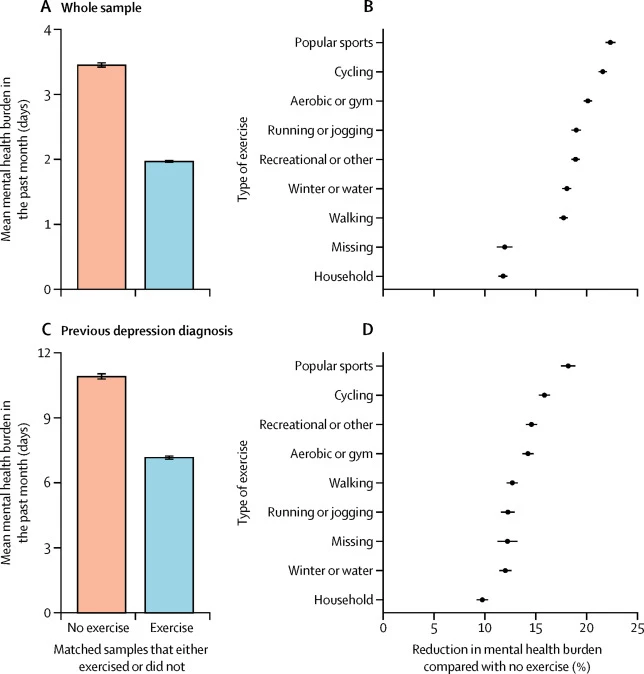
You often get a good cardio workout when engaging in physical volunteer work. Most people volunteering are unaware that they are actively exercising their lungs and heart. The most physically stimulating volunteer jobs are in sports.
You can get tasks like refereeing for a school’s little league, being a steward at a game, etc. Note that light volunteer jobs could also improve your cardio.
Anything that requires physical exertion is a plus. Getting a cardio workout is easy, making it ideal for elderly volunteers.
13. It Is A Healthy Mental Health Distraction
Some people are more predisposed to having depressive thoughts and feelings. They could be working intense jobs or have trauma from the past. These thoughts often get overwhelming, and people need to distract themselves.
Volunteering is a healthy and calm way of managing mental anxiety. Many psychologists recommend finding a healthy way to cope with mental health issues.
Graphical relationship between mental health and volunteer/non-volunteers
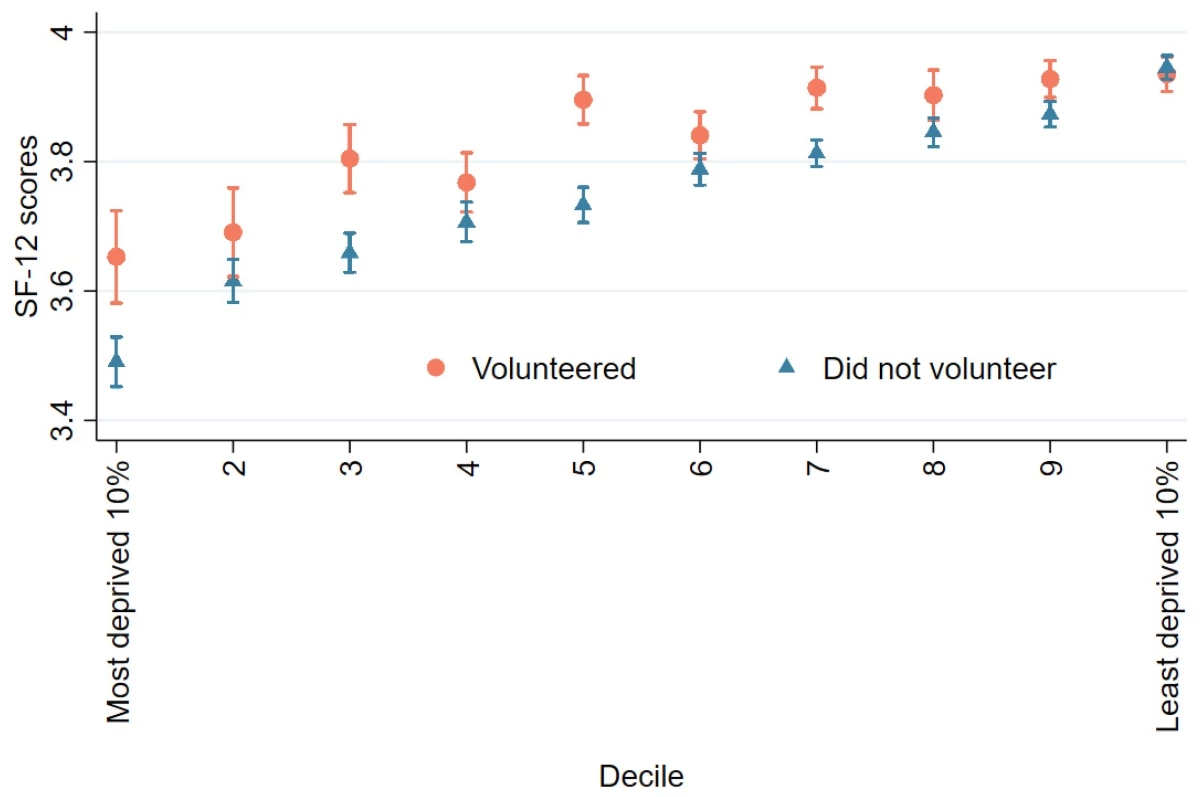
Volunteering can be therapeutic for some folks. When you volunteer, you give your time and attention to a certain cause. You receive the satisfaction of making other people’s lives better.
It helps many people find solace in making other people happy. Dealing with emotions can be difficult, and opening up and addressing your issues might take time. If you are not ready to do so, activities like volunteering could be helpful.
Note that volunteering is not a substitute for addressing mental health issues. People must seek help from professionals.
14. Better Energy Levels
Did you know that volunteering helps you get better energy levels? If you frequently engage in physical activities, your body adjusts and metabolizes better to provide more energy.
Volunteering could be just the key you need to unlock more energy to get you through your day. Your body quickly settles into metabolic patterns based on your routine. If you don’t often stimulate your muscles, your body energy requirements will be low.
Simplified depiction of the energy level changes and the metabolic rate.

It is why many people experience energy dips, especially in the evenings. Physical activity improves your metabolism and retrains your body. Volunteering helps, especially when the tasks are physically demanding.
Engage in activities that improve your metabolism. The changes are normally gradual, but you might notice the changes after a while. A little boost of energy could go a long way in improving the quality of your day. You have to be committed to the volunteer task.
Conclusion
The Health benefits of volunteering are enormous. There are many advantages to participating in these projects. The main intention of volunteering is to donate your time and effort toward a charitable cause. Volunteers expect nothing in return, but they get many mental and physical health benefits.
Volunteering helps people deal with stress and depression. It helps people get physically fit, and this has many advantages. There are many incentives for people to volunteer, particularly for physically intense tasks. The article explains how these activities improve mental, physical, and social health.


